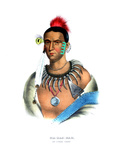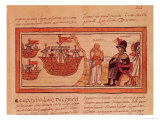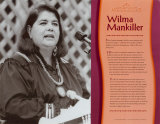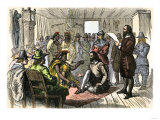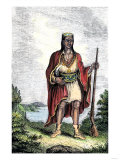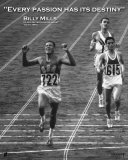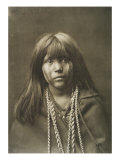|
|
|
|
|
|
|
|
|
|
|
|
BOOKS ABOUT NATIVE AMERICAN CHIEFS
|
|
|
|
|
|
|
|
|
|
|
|
|
|
|
|
|
|
|
|
|
|
 |
|
|
|
|
|
|
Chief Mahaska
c. 1784-1834; Iowa
Mahaska, a chief of the Iowa tribe, was born near present day Burlington, Iowa. He was killed by a member of his tribe that he had helped arrest for the avenging the death of another Iowa.
Mahaska County in Iowa was named for him, as is a Civil War era wooden sidewheel steamer, the USS Mahaska.
|
|
|
|
La Malinche aka Doña Marina
b. c. 1496; Mexico
d. c. 1529 (or 1550)
La Malinche, also known as Doña Marina, was a Nahua woman from the Mexican Gulf Coast. She was one of twenty slaves given to Hernán Cortés by the natives of Tabasco in 1519 and acted as interpreter, advisor, intermediary for the Spanish.
Later she became a mistress to Cortés, giving birth to his first son, Martín in 1522, who is considered one of the first Mestizos (people of mixed European and indigenous Amerindian ancestry).
The contemporary view of La Malinche is either as a founding figure of the Mexican nation, or as a traitor to the indigeous peoples.
|
|
|
|
Wilma Mankiller
b. 11-18-1945; Tahlequah, OK
d. 4-6-2010
In the Cherokee language, Mankiller means someone who protects the village – a defender of the people. For Wilma Mankiller, chief of the Cherokees from 1985 to 1995, it is a fitting name.
Wilma was born in Tahlequah, Oklahoma, in 1945. Even though her family and the other people around her were poor, she was happy because she was surrounded by her Cherokee culture. When Wilma was 12, the U.S. government uprooted her family to San Francisco. The idea was to help Native Americans blend in with white society. But big city life was a shock to her family and they struggled to hold on to their Cherokee heritage. As a young adult, Ms. Mankiller grew interested in Indian politics and she eventually returned to the land where she was born.
In 1985, Ms. Mankiller became the first woman ever to serve as Principal chief of the Cherokees. Although at first some people did not want a woman for chief, they changed their minds when they saw how much she was helping the tribe. She brought new jobs to the area and helped poor women start businesses. She also improved the Cherokee court system and opened medical clinics. Chief Mankiller chose not to run for reelection in 1995, but she has stayed active in politics, speaking out for women's rights and the environment, as well as Native American issues. In 1998, Ms. Mankiller was awarded the Presidential Medal of Freedom – the nation's highest civilian honor.
• Every Day is a Good Day: Reflections of Contemporary Indigenous Women
|
|
|
|
Massasoit
b. 1581; present day Rhode Island
d. 1661
According to English sources, Massasoit, the leader of the Wampanoag Confederacy, prevented the failure of Plymouth Colony and the almost certain starvation that the Pilgrims faced during the earliest years of the colony's establishment.
Massasoit was the father of Metacomet.
|
|
|
|
Russell Means
b. 11-10-1939; Wanblee, SD
Russell Means of the Oglala Sioux is an activist organizing for the rights of Native Americans. He was a member of the American Indian Movement (AIM).
|
|
|
|
Metacomet (King Philip)
b. 1639
d. 8-12-1676; killed in King Philip's War
Metacomet was the second son of Massasoit. He adopted the English ways, including the name Philip, but when the Iroquois Confederacy pushed eastward, and the English demanded concessions of land, hostilites broke out. King Philip's War was one of the most costly and bloodiest conflicts in American history.
|
|
|
|
Billy Mills
b. 6-30-1938; Pine Ridge, SD
Billy Mills, a virtually unknown runner, won the 10,000 Meter in Tokyo at the 1964 Olympic Games. Mills, a member of the Oglala Lakota Sious tribe attended the Haskell Institute in Lawrence, KS and earned an athletic scholarship to the University of Kansas.
• Running Brave (1983) DVD
|
|
|
|
N. Scott Momaday
b. 2-27-1934; Lawton, OK
Writer Navarre Scott Momaday was awarded the Pulitzer Prize for Fiction in 1969 for his novel House Made of Dawn which led the breakthrough of Native American literature into the mainstream. Momaday is of Kiowa-Cherokee heritage.
|
|
|
|
Mosa - Mohave, 1903
Mosa, a young Mohave girl, was made famous by photographer Edward S. Curtis.
“It would be difficult to conceive of a more thorough aboriginal than this Mohave girl. Her eyes are those of the fawn of the forest, questioning the strange things of civilization upon which it gazes for the first time. She is such a type as Father Garces may have viewed on his journey through the Mohave country in 1776.” Curtis
The Mohave live on the Mohave Indian Reservation, in the Mojave Desert, that straddles the border between California, Arizona, and Nevada.
|
|
|
|
Mourning Dove
b. 1888; Idaho
d. 8-8-1936
Mourning Dove was the pen name of Christine Quintasket, an Okanogan Indian of the Northwest coast. She put her mission education to use in the service of her native culture by becoming an important chronicler of the life ways of her people, thus preserving knowledge that might have been lost.
Mourning Dove’s best-known book, Coyote Stories, first published in 1933, is one of the first collections of native stories that was gathered and transcribed by a Native American.
|
|
|
previous page | top | next
List Notable Native Americans > a | b | c | d-e-f-g | h-i-j | k-l | M | n-o-p-q | r | s | t-v-w-x-y-z
|
|
I have searched the web for visual, text, and manipulative curriculum support materials - teaching posters, art prints, maps, charts, calendars, books and educational toys featuring famous people, places and events - to help teachers optimize their valuable time and budget.
Browsing the subject areas at NetPosterWorks.com is a learning experience where educators can plan context rich environments while comparing prices, special discounts, framing options and shipping from educational resources.
Thank you for starting your search for inspirational, motivational, and educational posters and learning materials at NetPosterWorks.com. If you need help please contact us.
|
|
|
|
















